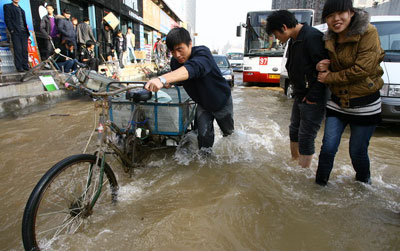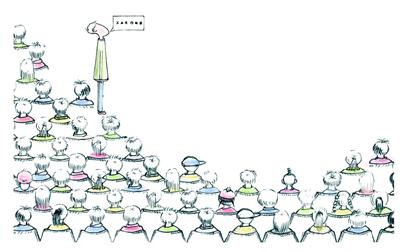Commentary from This Week's Paper

Expectations for China's General Administration of Sports
By Jiang Lei, EO commentator
Comment, Page 16
~Although China won the most gold medals at the Beijing Olympics and will surely lead the Asian Games, people still doubt the future performance of the General Administration of Sports.
~China has won more than 100 gold medals in the Asian Games, but ordinary people will never feel pride about the victories of Chinese athletes because those medals have nothing to do with them.
~Chinese cities still lack sports facilities, as does the countryside. China's the top medal-winner, but Chinese people are not that healthy and strong. China lags behind 100 other nations in its number of sports facilities per capita.
~Although athletes who have won medals may be well treated after they compete, many of their fellow athletes have been facing difficulties since they retired thanks to the country's inadequate social security services.
Original article: [Chinese]

The Local Government Should be Responsible for Zhengzhou's Water Main Explosions
By Zhou Minghua
Economic Observer Online
~Water pipes in Zhengzhou City, the capital of Henan Province, have exploded twice in six days, flooding the city.
~Zhengzhou has witnessed 11 pipe eruptions during the past seven years and pipe explosions have occurred three times this year.
~He Chun Biao, head of the local water department, has attributed the explosions to the "complexity of the city's water supply system". That's far from convincing considering the fact that every city's water supply system is complicated, but only Zhengzhou has experienced so many water main eruptions.
~Zhengzhou's water supply system has been repaired many times in recent years, but each repair was only a temporary fix.
~Though the public has expressed doubt and resentment towards the local government, there have been no improvements during the past few years.
Original article: [Chinese]
We Should Treat Reform of Government Car Expenses Like GDP
By Tao Duanfang
Economic Observer Online
~The large number of and the high costs of the cars used by the Chinese government have become a subject of controversy and have drawn public attention. It has been reported that the amount of money spent on government cars is more than China spends on the military.
~For many years there have been calls for reform on government car expenses. Different cities and departments have pushed forward reform in various ways, but the high cost issue has not been solved.
~In some places, reform has taken place by the implementation of a traffic allowance. Officials at different levels of authority received allowances according to their hierarchy, which was labeled a "covert salary increase" by the public. The number of government cars was not reduced after this attempt at reform.
~If we stick to old methods of thought to carry out the reform, it will become another instance of the reallocation of welfare and the privatization of public resources.
~The main issue is that in many local governments and departments, government cars are not seen as vehicles or office equipment, but as a symbol of power and social status.
~Why is it that different levels of government are able to fulfill GDP quotas so efficiently? Because their fulfillment is closely linked to the future of their respective departments and their careers.
~If we want to find a fundamental solution to this problem, we have to connect the reform of government car expenses with the vital interests of government departments and officials.
Original article: [Chinese]

Questions from Elite College Students
By Shi Jianzi
Economic Observer Online
~British Prime Minister David Cameron is probably surprised that the event which received the most attention during his visit to China was his speech at Peking University, and not his substantial economic cooperation gains. The first question he was asked by Peking University students was "As well as giving China suggestions, what can Britain learn from China?"
~According to Xu Xioaping, vice president of the New Oriental School, during the initial stages of China's reform and opening, people's thoughts were more open and contained a deeper spirit of self-reflection; and our national confidence at that time was stronger.
~College students always ask questions about generic topics without depth. For example, a student at Fudan University asked US President Obama: "What measures would you take to help to guide the world to develop multiculturalism?"
~"Questions from students seem complete, but none of them touch the essence of the issues raised. In China there is a lack of democracy education and training for free expression." Xu said.
~According to Liu Yu, author of the best-seller The Details of Democracy, the lack of discussion about public issues in our nation makes it impossible for students to ask proper questions.
~Who produced this type of student? Xu thinks the answer to this question is the Chinese education system. Chinese students are scared of provoking a negative response from the masses and thus ask safe, "stable" questions.
Original article: [Chinese]
Shuffling the Cards of International Diplomacy: New Roles of America and China
By Ding Li, Senior Editor with the Economic Observer
Observer, page 44
~From the convening of two major international summits recently, the G20 and APEC, the changing roles that America, China, Europe and other Asian countries are playing on the world stage is beginning to become apparent.
~America is determined to "return to Asia" by playing a larger role in the shaping of local affairs and by attempting to form closer relationships with countries in eastern and southern Asia, such as Vietnam and India. We can see an example of this in U.S. President Obama's recent support for India's bid to become a permanent member of the UN Security Council.
~Meanwhile, China is improving its relationship with European countries by providing financial aid to Portugal and purchasing more goods from France and Britain.
~However, it's not only the international roles of these countries that are shifting, but their domestic situations are also undergoing major reforms.
~This is especially true of China. It's in the process of transitioning from a planned economy to a market-oriented economy while at the same time attempting to maintain social stability.
Original article: [Chinese]
Delays in Market Reform are the Real Cause of Inflation
By Zou Weiguo, Editor with the Economic Observer
Comment, Page 16
~Many people have attributed China's current inflation to excessive liquidity. But the real cause of inflation is instead the delays in introducing market reforms.
~Under the planned economic system, Chinese people didn't have to pay for housing and other daily commodities were also subsidized. Demand for capital in the country's relatively undeveloped financial system was also very limited.
~The real reason for the current inflationary pressures is that increasingly capital-rich individuals have few places they can investment their funds. Too many sectors - including oil, telecommunications, railway and finance are all dominated or controlled by state-owned enterprises. Not to mention restrictions on land ownership.
Original article: [Chinese]
Children from the Countryside, Say "Good Bye" to your Peking University Dream
By Li Li
Economic Observer Online
~Students originally from the countryside currently attending Peking University make up less than 1 percent of the student body, compared with the 70 percent they used to make up two or three decades ago, a clear indication that educational resources are imbalanced.
~Big cities have more universities, which enroll a higher proportion of local students; therefore urban students have more opportunities to enter university.
~Graduates from teacher training programs prefer a teaching job in the big cities so the students who are born in urban areas get better teachers and better educated.
~Now Tsinghua University and Peking University have become aristocratic. China's economic development imbalance has affected the allocation structure of educational resources: rural students have been behind from the start.
Original article: [Chinese]
Gas Shortage Has Become a Bargaining Chip
By Jiang Lei
Economic Observer Online
~Natural gas was in tight supply in Wuhan on November 23, which is a sign that a natural gas shortage might reemerge.
~ The explanation for the tightening of supply that was given by PetroChina and the other three big oil companies was the discrepancies between supply and demand. The oil companies stated they would have to raise the price of gas to be able to import and meet the public demand.
~Gas price is not supposed to be used as a bargaining chip by PetroChina, because as an enterprise monopoly, they make huge profits on the sale of gas, and can easily keep prices stable and subsidize the cost of imported gas.
~ As an enterprise with a monopoly on the market, PetroChina should make people's livelihood their highest priority instead of profit.
Original article: [Chinese]
Chinese-made Large Aircrafts Have a Long Way to Go
By Liu Weiyun
Economic Observer Online
~ The 8th China International Aviation& Aerospace Exhibition came to a close on November 21. The Commercial Aircraft Corporation of China (CACC) signed two commercial contracts with clients, which was the first step of the CACC entering the market.
~ The news about these commercial deals is exciting for China's plane manufacturing industry.
~ On the other hand, journalists were not allowed to witness the contract signing ceremonies, and they did not receive more information about the agreement.
~ There were lots of rumors which about why the CACC missed the opportunity to present a positive company image.
~ While people expect Chinese-made aircrafts to be commercially successful, commercial success is not just about product quality and service, but also relies on good public relations and company image. The CACC should be more transparent and open in order to compete with Boeing and Airbus.
Original article:[Chinese]
Image 1
The views posted here belong to the commentor, and are not representative of the Economic Observer |
Related Stories
Popular

- FIVE-YEAR PLAN
- The 11th Five-year Plan - A Report Card
- What stopped several central government departments from achieving their targets?
Interactive
Multimedia

- EEO.COM.CN The Economic Observer Online
- Bldg 7A, Xinghua Dongli, Dongcheng District
- Beijing 100013
- Phone: +86 (10) 6420 9024
- Copyright The Economic Observer Online 2001-2011
















